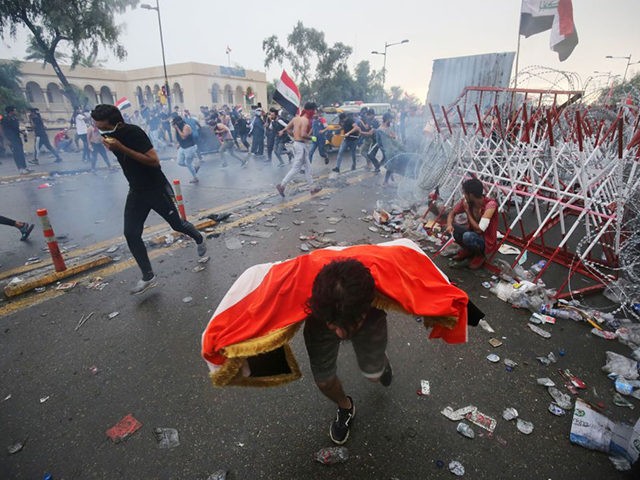Iraqi police fired tear gas and stun grenades on Friday as protests resumed in Baghdad after three weeks of relative calm. There were also reports of live rounds being fired.
The Iraqi Human Rights Commission reported 21 killed and 1,779 injured in disturbances around the country.
The new protests were animated by the same concerns as the ones in September: corruption, poor public services, and high unemployment. Demonstrators on Friday additionally expressed outrage at the use of deadly force against those who took to the streets last month.
“On Friday there won’t be a protest, there will be a revolution and I will be proudly one of the revolutionists in Iraq,” one protester told the Kurdish news service Rudaw, comparing the 157 killed during September’s marches to the gruesome atrocities perpetrated by former dictator Saddam Hussein.
“I protested in early October to make a change, but on Friday, I will raise my Iraqi flag and revolt against the current corrupted officials,” another man declared as he took to the streets of Baghdad.
The previous round of protests was suspended in early October due to observance of the Shiite religious holiday of Arbaeen, which involves pilgrimages to the Iraqi city of Karbala. Influential Shiite cleric Muqtada al-Sadr is now encouraging his supporters to return to the streets, and like the Baghdad residents quoted by Rudaw, he is talking more about “revolution” than holding a few big rallies to press for political reforms.
“The government leaders and politicians are in a state of fear because of you. They are completely unable to fix anything within this country. Therefore, I ask everyone to start the revolution which will clean Iraq from the corrupt and fools,” Sadr said on Friday.
Iraqi Prime Minister Adil Abdul-Mahdi tried to head off the renewed protests with a package of reforms unveiled on Wednesday, including a beefed-up central court where “corrupt officials” could “face justice” and cutting his own salary in half, but his gambit does not seem to have paid off.
“We are faced with a systemic crisis that was not recognized by the political parties or the powers of the state. However, the people, through their awareness and consciousness, realized it, which explains the wide popular movement that we see today,” he said in a televised national address on Friday morning.
The prime minister appealed for calm, urged officials to respect the rights of protesters, and promised to reshuffle his cabinet next week with an eye toward “merit, independence of the ministers, and a greater presence of women and youth.”
Although he gave no indication of stepping down as the protesters have demanded – he actually mocked critics who thought his history of resigning from previous positions under fire mean he is ready to throw in the towel — Abdul-Mahdi conceded that “the call for toppling the government, early elections, and constitutional amendments is a legitimate right.”
“The resignation of the government, without providing the constitutional alternative, means leaving the country to chaos,” he warned.
Abdul-Mahdi argued that the “armies of millions of the unemployed,” the problem of poor public services, and rampant corruption did not “pile up” during his own term office.
“That is why I am saying we are facing a systemic crisis, for which we all need to work to correct, and the scream of the Iraqi people is correct,” he said.
Shouting slogans such as “Baghdad is free, corruption is out!” thousands of demonstrators converged in Tahrir Square on Friday, dismantled police barriers, and tried to push into the “Green Zone,” where government buildings and foreign embassies are located. Scores of injured people were ferried away from the ensuing confrontation with riot police, including at least one reporter and one member of the Iraqi Human Rights Commission. Numerous government buildings and political offices were reportedly set on fire by protesters.

COMMENTS
Please let us know if you're having issues with commenting.